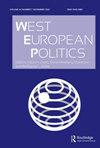是什么造就了“不幸的婚姻”?2023年芬兰大选
IF 4.5
1区 社会学
Q1 POLITICAL SCIENCE
引用次数: 0
摘要
本文章由计算机程序翻译,如有差异,请以英文原文为准。
The making of an ‘unhappy marriage’? The 2023 Finnish general election
Abstract Rarely, if ever, has a Finnish general election attracted such foreign media interest. Reporters came from across the globe, not to witness Finland become NATO’s thirty-first member-state on 4 April, two days after the general election, but to see if the party-loving Social Democrat prime minister Sanna Marin could secure a second term at the helm. 1 In the event, Marin became only the third prime minister in recent times to increase the party vote, albeit by not quite enough, and she promptly indicated she would stand down as party leader. The election was won by the two main opposition parties, the National Coalition and Finns Party. The National Coalition became the largest parliamentary party for only the second time in its history, whilst the Finns Party gained over one-fifth of the national poll for the first time and became the largest party on the basis of the popular vote in no less than half the 12 mainland constituencies. Despite their deep differences on major policy issues – including immigration, taxation, development aid and climate policy – the National Coalition and Finns Party ultimately formed the core of a centre-right government, although it took almost to midsummer to do so, and it was then characterised by a minor coalition party leader as an ‘unhappy marriage’ made out of necessity.
求助全文
通过发布文献求助,成功后即可免费获取论文全文。
去求助
来源期刊

West European Politics
POLITICAL SCIENCE-
CiteScore
10.00
自引率
7.10%
发文量
58
期刊介绍:
West European Politics (WEP)has established itself as one of the most authoritative journals covering political and social issues in Western Europe. It has a substantial reviews section and coverage of all national elections in Western Europe. Its comprehensive scope, embracing all the major political and social developments in all West European countries, including the European Union, makes it essential reading for both political practitioners and academics.
 求助内容:
求助内容: 应助结果提醒方式:
应助结果提醒方式:


